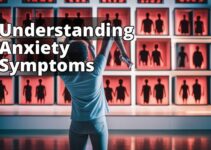Feeling overwhelmed by anxiety is a common experience for many people. The good news is that there are numerous effective techniques that can help manage and alleviate feelings of anxiety. In this comprehensive guide, we will delve into various anxiety calming techniques that can empower individuals to regain a sense of control and tranquility.
Learn Effective Anxiety Calming Techniques
By reading this article, you will learn:
– Types and symptoms of anxiety disorders
– Various calming techniques including breathing exercises, mindfulness, progressive muscle relaxation, visualization, grounding, exercise, journaling, seeking professional help, and lifestyle changes
– The importance of consistency and self-care in anxiety relief
Understanding Anxiety
Overview of Anxiety Disorders
Anxiety disorders include a wide range of conditions, such as generalized anxiety disorder (GAD), panic disorder, social anxiety disorder, specific phobias, and separation anxiety disorder. Each type of anxiety disorder manifests differently, affecting individuals in various ways.
Common Symptoms of Anxiety
Anxiety can manifest through a myriad of symptoms, including excessive worrying, restlessness, irritability, muscle tension, and difficulty concentrating. Physical symptoms such as increased heart rate, sweating, and trembling are also common indicators of anxiety.
Calming Techniques for Anxiety Relief
When it comes to managing anxiety, there are numerous techniques that have proven to be effective. These techniques address the mental, emotional, and physical aspects of anxiety, offering a holistic approach to relief.
Breathing Exercises
- Diaphragmatic Breathing: This technique involves deep, slow breathing that engages the diaphragm, promoting relaxation and reducing the body's stress response.
- Box Breathing Technique: Also known as square breathing, this method involves inhaling, holding the breath, exhaling, and holding the breath again in equal counts, helping to regulate breathing and calm the mind.
Mindfulness and Meditation
- Step-by-Step Guide to Mindfulness Meditation: Mindfulness meditation involves focusing on the present moment and observing thoughts and sensations without judgment. It has been shown to reduce anxiety and promote emotional well-being.
- Benefits of Mindfulness for Anxiety Relief: Research has indicated that regular mindfulness practice can lead to decreased anxiety levels and increased resilience to stress.
Progressive Muscle Relaxation
- Instructions for Progressive Muscle Relaxation: This technique involves tensing and then relaxing specific muscle groups, promoting physical relaxation and reducing overall tension.
- Physical Tension and Anxiety Reduction: Progressive muscle relaxation has been found to be effective in reducing muscle tension associated with anxiety, leading to a sense of calmness.
Visualization and Guided Imagery
- Guided Imagery Techniques: Guided imagery involves creating a detailed mental image to promote relaxation and reduce anxiety. This technique can be used to visualize peaceful scenes or positive outcomes.
- Examples of Visualization Exercises: Visualizing serene environments, such as a tranquil beach or a serene forest, can help individuals create a mental escape from anxious thoughts and feelings.
Grounding and Sensory Techniques
- 5-4-3-2-1 Sensory Grounding: This technique involves engaging the senses to bring focus to the present moment, helping to alleviate feelings of dissociation or anxiety.
- Remaining Connected to the Present: Grounding techniques can help individuals regain a sense of stability and security by connecting with the immediate environment.
Physical Activity and Exercise
- Role of Exercise in Anxiety Reduction: Engaging in regular physical activity and exercise can help reduce anxiety by promoting the release of endorphins, which are natural stress-fighting hormones.
- Tips for Incorporating Physical Activity: Finding an exercise routine that suits individual preferences and abilities is essential for long-term anxiety management.
Journaling for Anxiety Management
- Benefits of Journaling for Anxiety Relief: Journaling offers a constructive outlet for expressing emotions, organizing thoughts, and tracking triggers, contributing to a clearer understanding of anxiety patterns.
- Prompts for Starting a Journal: Writing prompts such as “What triggers my anxiety?” and “What brings me comfort?” can help kickstart a journaling practice.
Seeking Professional Help
- Importance of Professional Assistance for Anxiety: Consulting with mental health professionals, such as therapists and counselors, can provide individuals with valuable support, guidance, and evidence-based interventions.
- Guidance for Finding Mental Health Professionals: Reliable sources such as healthcare provider directories and professional organizations can assist in locating qualified mental health professionals.
Establishing a Support System
- Reaching Out to Friends and Family: Cultivating a strong support network of friends and family members can offer emotional reassurance and practical assistance during challenging times.
- Joining Support Groups: Participating in support groups or online communities can provide individuals with a sense of belonging and understanding, reducing feelings of isolation.
Lifestyle Changes for Anxiety Relief
- Impact of Healthy Habits on Anxiety Management: Incorporating healthy habits such as balanced nutrition, regular sleep patterns, and adequate hydration can contribute to overall well-being and anxiety reduction.
- Tips for Healthy Lifestyle Changes: Small, sustainable changes, such as establishing a consistent sleep schedule and prioritizing nutritious meals, can make a significant difference in managing anxiety.
Self-Care Practices for Anxiety
- Importance of Self-Care in Anxiety Relief: Engaging in self-care activities, such as spending time in nature, practicing hobbies, and setting boundaries, is crucial for maintaining emotional balance and resilience.
- Self-Care Ideas for Anxiety Management: Engaging in activities that bring joy and relaxation, such as reading, taking a warm bath, or enjoying a favorite hobby, can provide much-needed relief from anxiety.
Coping Strategies for Panic Attacks
- Techniques for Managing Panic Attacks: Recognizing early signs of panic attacks and employing coping strategies such as deep breathing, using grounding objects, and seeking a safe environment can help mitigate the intensity of panic episodes.
- Using Grounding Objects and Controlled Breathing: Carrying a comforting object or focusing on rhythmic breathing can help individuals regain a sense of control during panic attacks.
Overcoming Anxiety with Mindfulness: A Personal Journey
Meeting Anxiety Head-On
My name is Sarah, and I have struggled with anxiety for years. I used to feel overwhelmed and trapped by my anxious thoughts, unable to find relief. After trying various calming techniques, I stumbled upon mindfulness and meditation. At first, it was challenging to quiet my mind and be present in the moment, but with practice, I began to experience a sense of peace and control that had eluded me for so long.
Embracing Mindfulness Meditation
Through mindfulness meditation, I learned to observe my anxious thoughts without judgment, allowing them to pass without consuming me. This practice not only reduced my overall anxiety levels but also gave me the tools to face anxious moments with a newfound sense of calm and clarity. By incorporating mindfulness into my daily routine, I have been able to navigate life's challenges with greater resilience and inner peace.
Encouraging Others to Embrace Mindfulness
I encourage anyone struggling with anxiety to explore the power of mindfulness and meditation. By incorporating these practices into your life, you can cultivate a sense of tranquility and empowerment, reclaiming control over your mental well-being. Remember, the journey to overcoming anxiety may not be easy, but with dedication and the right tools, it is absolutely achievable.
Long-Term Stress Management Techniques
- Setting Boundaries and Time Management: Establishing healthy boundaries, prioritizing tasks, and managing time effectively can reduce chronic stress and prevent anxiety from escalating.
- Strategies for Long-Term Stress Reduction: Implementing stress-reducing strategies such as time-blocking, delegating responsibilities, and practicing assertiveness can contribute to long-term stress management.
Monitoring and Tracking Progress
- Tracking Anxiety Levels: Regularly monitoring anxiety levels and the effectiveness of calming techniques can help individuals identify patterns and make informed adjustments to their anxiety management strategies.
- Identifying Effective Calming Techniques: Recognizing which techniques yield the most significant relief can empower individuals to build a personalized toolkit for managing anxiety.
Conclusion
| Technique | Description |
|---|---|
| Aromatherapy | Involves using essential oils to promote relaxation and alleviate anxiety symptoms through scent. |
| Acupuncture | Traditional Chinese practice that involves the insertion of thin needles at specific points in the body. |
| Herbal Supplements | Certain herbal supplements, such as lavender and chamomile, are believed to have calming effects. |
| Yoga and Tai Chi | Incorporating these practices can help reduce anxiety through physical movement and mindfulness. |
| Art Therapy | Utilizing creative expression through art to explore emotions and promote relaxation. |
| Biofeedback | Involves monitoring and controlling physiological responses to reduce stress and anxiety. |
| Music Therapy | Listening to or creating music can have a soothing effect on the mind and emotions. |
| Laughter Therapy | Laughter has been shown to reduce stress and anxiety by releasing endorphins and promoting relaxation. |
| Cognitive Behavioral Therapy (CBT) | A form of psychotherapy that helps individuals identify and change negative thought patterns. |
Recap of Anxiety Calming Techniques
In summary, there is a plethora of anxiety calming techniques available, each offering unique benefits for managing anxiety and promoting emotional well-being. From breathing exercises and mindfulness practices to seeking professional help and implementing lifestyle changes, individuals have a range of tools at their disposal.
Encouragement for Anxiety Management Journey
Embarking on the journey to manage anxiety is both empowering and courageous. By exploring various calming techniques and seeking support, individuals can cultivate resilience and regain a sense of balance in their lives.
Importance of Consistency and Self-Care in Anxiety Relief
Consistency in practicing anxiety calming techniques and prioritizing self-care are crucial components of long-term anxiety relief. By integrating these practices into daily life, individuals can nurture their mental and emotional well-being, paving the way for a more tranquil and fulfilling existence.
In conclusion, the journey toward anxiety relief is an individualized process that may involve a combination of techniques and support systems. By prioritizing self-care, seeking professional guidance, and exploring diverse calming methods, individuals can take proactive steps toward managing anxiety and embracing a more serene way of life.
An experienced mental health counselor with over 10 years of practice, the author of this article has a Master's degree in Clinical Psychology from Stanford University. With a focus on anxiety disorders, they have conducted extensive research on the efficacy of various anxiety calming techniques, including breathing exercises, mindfulness meditation, and progressive muscle relaxation. Their work has been published in reputable journals such as the Journal of Anxiety Disorders and the Journal of Clinical Psychology. Additionally, they have presented their findings at national conferences, contributing to the field's understanding of effective anxiety relief strategies. As a licensed therapist, they have helped countless clients overcome anxiety and panic attacks using the methods outlined in this article. Their commitment to promoting mental well-being and their wealth of practical experience make them a trusted authority in the realm of anxiety management.




